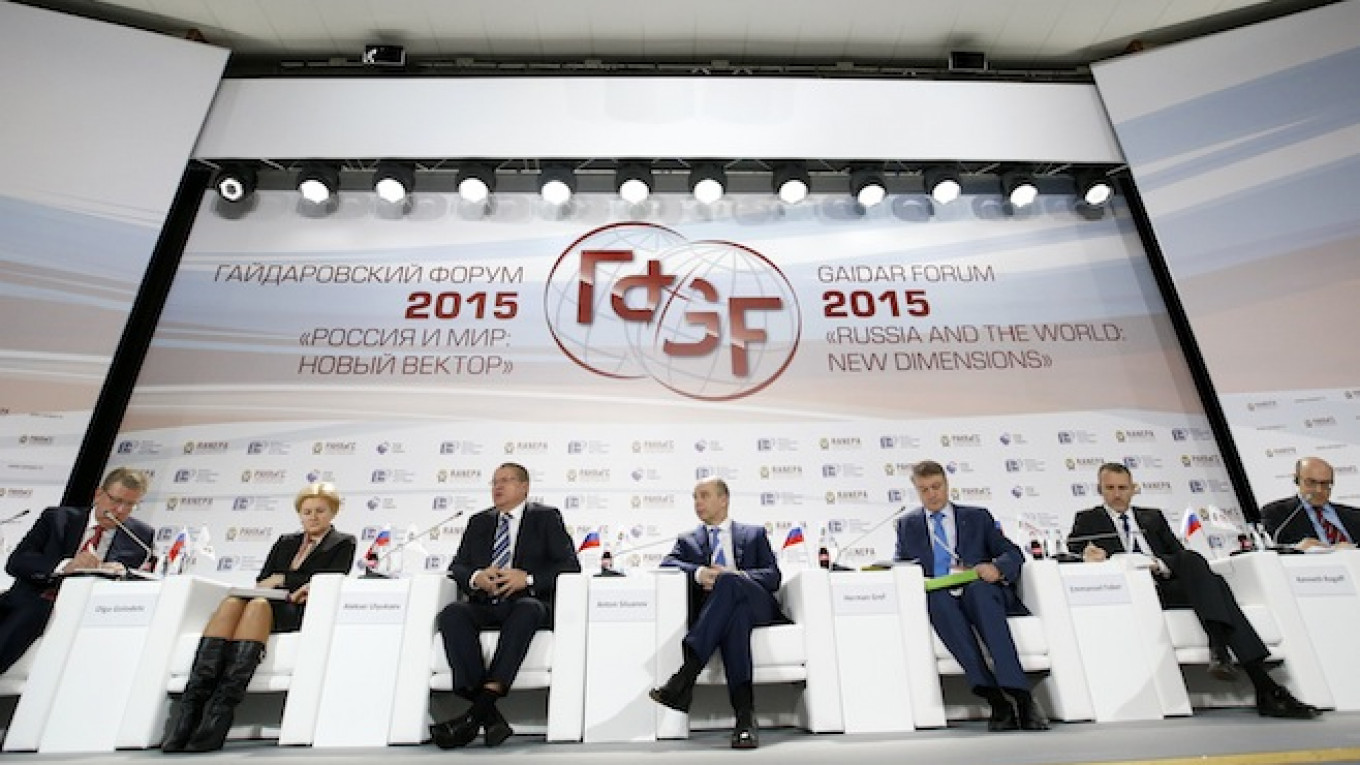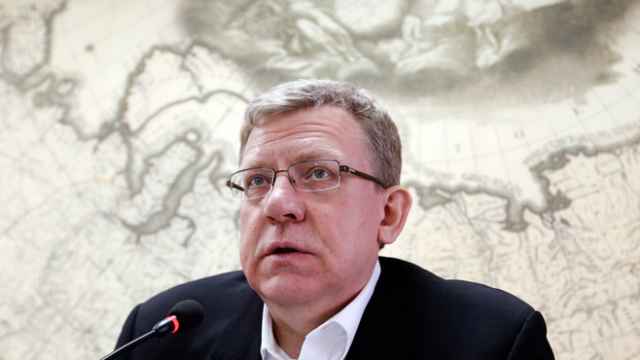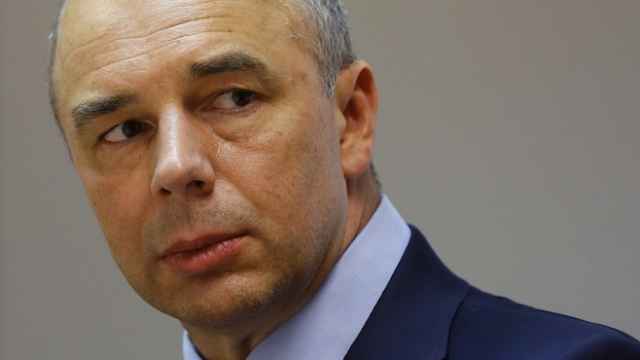Russian top government officials and international experts gathered at the annual Gaidar Forum on Wednesday in Moscow to deliver their vision of the Russian economy's future.
Here are the highlights so far:
Prime Minister Dmitry Medvedev
"Russia, even under current conditions, is not going to cut itself off from the world."
"We made a huge step from a post-Soviet, half-ruined economy to a major economy of Western type. It would be a monstrous mistake to return to the past … to reject the role of an active player in the modern, globalized world."
"The authorities will not renounce free conversion of the ruble."
"I think that the policy the Central Bank is conducting at present is the right policy. We are not going to eat up foreign reserves. We have enough economic mechanisms to safeguard ruble stability."
"Even with poor economic sentiment, we have a positive balance of payments, the main fundamental factor for setting a balanced exchange rate of the national currency."
"Russia will honor its international obligations. We are not refusing to fulfill them. Our country is a reliable borrower, a reliable creditor, a reliable supplier."
"Sanctions come and go … like their authors."
"We have considerable reserves that guarantee repayment of state debt. If necessary, we will be able to help firms pay back their foreign debt.""The authorities won't just wait for the oil price to rise … We need to learn to live with low prices on energy resources."
"We will continue to work on developing import substitution."
"Russia's Central Bank will provide funding for banks to finance investment projects."
"We will increase support of non-commodity exports, work more actively with potential buyers of Russian output."
"Companies with state participation now require tighter controls."
"Our goal is not to throw money at the crisis. This is useless, we understand that. Our goal is to set free entrepreneurial initiative."
"We will continue fighting inflation."
"We should ensure the lowering of interest rates on credit to more comfortable levels."
"In the current conditions, the procedure for calculating the budget rule may require a correction to take into account forecasts of prices on energy resources."
"Raising the competitiveness of the Russian economy is not possible without strengthening of international ties... We value the ties developed with Europe over decades, this is still our main trade partner. I hope these ties will be normalized in a short time, we definitely want that."
"Our country provided a $3 billion dollar loan to Kiev... One of the conditions of this loan was that Ukraine's state debt level does not pass 60 percent of GDP. Today, this condition is violated. So, no matter what Ukrainian leaders say, we have grounds to demand early repayment of the loan."
"In the budget our neighbors adopted... we have not seen the resources to repay financial obligations to Russia at all."
"We don't want Ukraine's default, aggravating the plight of Ukraine's economy. On the contrary, we need a partner that is alive. But debts must be paid."
Sberbank CEO German Gref
"Clearly we have a problem with the investment climate."
"It is becoming clear for everyone today — as long as these reforms (of judicial and law enforcement bodies) are not carried out, pressure on business is not lowered, transparency in ownership rights and the work of the whole law-enforcement system is not increased, there can be no talk of improving the investment climate."
"Sanctions hardly ever have any results, especially sanctions aimed at major countries."
"I think we have no alternative to the following — keeping the current level of budget spending ... We need a radical turn in economic policy. A radical turn that ends paradigms, breaks stereotypes and sharply revives business' trust in the authorities. Without this trust we will no longer be able to carry out any policies."
"I think if we are not implementing even five percent of the modern management practices in the vast majority of successful countries. We cannot call ourselves a country with an effective management system. This refers to everyone without exception, including major corporations."
Finance Minister Anton Siluanov
"With last year's results, we will boost reserves — which we will need very much this year — by 370 billion rubles... The Reserve Fund now stands at some 5 trillion rubles and correspondingly will rise by 370 billion rubles."
"We think that with the (average) oil price at $50 per barrel (in 2015) ... we will lose some 3 trillion rubles in revenues."
"On top of that, there is a problem with sources for financing the state budget deficit. Of course, we have to adjust our capabilities. The state cannot have the spending it used to have with economic growth ... (and) with the oil price at 100 dollars per barrel."
"We need to correct state spending."
"Regardless of having already curbed 2015 spending, we will ask parliament to cut by 10 percent all expenditure apart from defense spending. This is the decision we have made."
"This will lead to cutting spending by nearly 1 trillion. But in fact we see this is not enough, with revenue lower by 3 trillion and problems with sources of financing."
"The budget envisages spending growth at 11.7 percent this year. With the lower pace of economic growth, this seems simply absurd. So we understand we must cut this growth. We should not cut spending. Let's raise it, but by 5 percent, not 11.7 percent. We simply can't afford more."
"We need to change, cancel, push back some spending."
"Sixty percent of budget spending is on defense and security as well as transfers to the pension fund and legal public (social) obligations."
"Infrastructure spending is some 1 trillion rubles ... I think this spending should be raised."
"We will have to use reserves this year even above the limits set out by the law, which allows us to draw 500 billion rubles of reserves. We will have to do more but we should not burn them out in a year and a half."
"We hope that oil price is close to finding its bottom now."
"We are ready to use the resources of the Reserve Fund, already now... to place them as liquidity on the market. I believe that if we realize part of our forex reserve fund, place it on the market, we will also make good money for the budget."
"The ruble is undervalued. We definitely can use some of the gold and currency reserves already, at the beginning of the year, to get revenue in their ruble equivalent."
Economy Minister Alexei Ulyukayev
"The global economy will never again be what it used to be in 2000-07 and the situation in Russia will never be the same. It will be much more complicated. It already is much more complicated."
"The measures we take must be adequate if the oil price is 130 (dollars per barrel) or 30."
Commenting on the chances of Russia being downgraded, he said: "Pretty high."
Deputy Economy Minister Alexei Vedev
"The peak in inflation will probably be in March-April, I hope lower than 20 percent year-on-year, at a level of 15-17 percent."
A Message from The Moscow Times:
Dear readers,
We are facing unprecedented challenges. Russia's Prosecutor General's Office has designated The Moscow Times as an "undesirable" organization, criminalizing our work and putting our staff at risk of prosecution. This follows our earlier unjust labeling as a "foreign agent."
These actions are direct attempts to silence independent journalism in Russia. The authorities claim our work "discredits the decisions of the Russian leadership." We see things differently: we strive to provide accurate, unbiased reporting on Russia.
We, the journalists of The Moscow Times, refuse to be silenced. But to continue our work, we need your help.
Your support, no matter how small, makes a world of difference. If you can, please support us monthly starting from just $2. It's quick to set up, and every contribution makes a significant impact.
By supporting The Moscow Times, you're defending open, independent journalism in the face of repression. Thank you for standing with us.
Remind me later.






